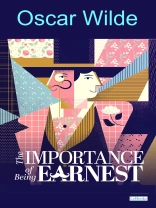Oscar Wilde, one of the great names in British literature, stood out for his sharp wit and social critique. In ‘The Importance of Being Earnest’, Wilde uses humor to satirize Victorian society, exposing the hypocrisy and absurdities of the era's moral values. The play follows the identity confusions and deceptions of its protagonists, creating a lighthearted and ironic comedy about social standards and marriage. ‘Salome’, on the other hand, is a dark and poetic play inspired by the biblical story. Written in French and later translated, it explores themes of desire and power, centering on the character of Salome and her fatal obsession with John the Baptist. Unlike his other comedies, ‘Salome’ showcases Wilde's tragic and daring side, adding an element of symbolism and provocation that challenged the norms of his time.
These two works are essential to understanding the versatility and depth of Oscar Wilde: ‘The Importance of Being Earnest’ reveals his talent for comedy and social critique through lightness and humor, while ‘Salome’ highlights his more poetic and daring side, exploring complex and dark themes. Together, they showcase Wilde's genius in moving between the comic and the tragic, making them essential readings for anyone seeking to understand the true essence of his literary legacy.
Tentang Penulis
Oscar Wilde was an Irish writer and poet, widely recognized as one of the most prominent figures in 19th-century literature. Born in Dublin, Wilde is known for his wit, his dramatic works, and his skill in exploring aesthetics and morality. His writings, which include plays, novels, and essays, reflect a critical view of Victorian society and a deep appreciation for beauty and art. Although he achieved fame during his lifetime, his reputation grew considerably after his death, making him an icon of literature and LGBTQ+ culture. Wilde is best known for his plays, such as *The Importance of Being Earnest* and *Salome*, which combine sharp humor with social critique. His only novel, *The Picture of Dorian Gray*, is a foundational work that explores themes of beauty, morality, and the quest for immortality. In the story, Dorian Gray, a young man who wishes to maintain his youth, makes a pact that leads to disastrous consequences. The work questions the limits of ethics and aesthetics, reflecting the duality of human nature. Wilde was also a prolific essayist, producing works like *The Decay of Lying*, where he discusses the importance of lying in art and the distinction between truth and appearance. His writing is marked by witty dialogues and a biting critique of society's hypocrisy.












